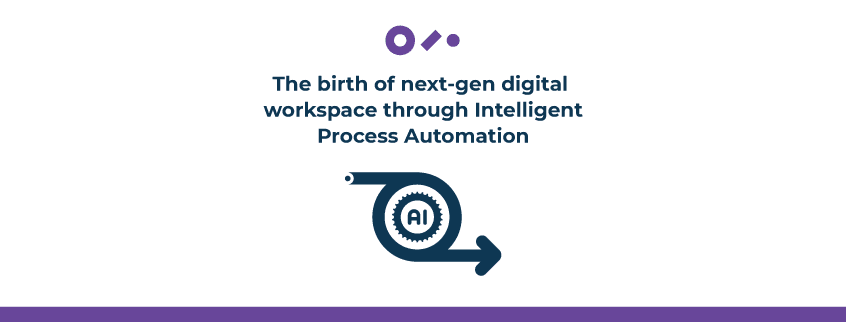No dearth of scope for Intelligent Process Automation: What’s next on the horizon for process automation

These are transformative times that we’re living in, and to progress in a technologically tumultuous age is to adapt to new advancements that aim towards making everyday life better. Intelligent Process Automation (IPA) is one of the newest such buzzwords that has begun to take the workspace by storm, inducing the next-gen innovations and a much better work efficiency at the workplace. However, the buck does not stop here; rather there are so many arenas that are left unexplored for IPA for BFSI and to be implemented in different industries.
According to a research report by Markets and Markets, the Intelligent Process Automation market was valued at USD 6.25 billion in 2017 and is projected to reach USD 13.75 billion by 2023, at a CAGR of 12.9% from 2018 to 2023. Companies globally are now recognizing the entry of Intelligent process automation solutions in the digital workspace. But what makes Intelligent Process Automation so different than regular process automation? Why do businesses require Artificial Intelligence to perform tasks that have been carried out by humans satisfactorily over a long time?
What do Businesses Really Need?
The answer to the above question lies solely on what kind of efficiency do organizations want to achieve in their daily workspace. The core idea behind Intelligent Process Automation assisting businesses is that employees will no longer have to spend time on repetitive tasks like entering data, copying, filling out customer forms, etc. Moreover, customer requests, queries, grievances, and other such things can be automatically addressed using IPA as a network of AI solutions working in tandem with external processes.
A McKinsey report says that companies believe in Intelligent Process Automation as a core part of next-generation operating models. Many companies have been experimenting with IPA and found some impressive results:
- Automation of 50 to 70 percent of tasks
- 20 to 35 percent annual run-rate cost efficiencies
- Reduction in straight-through process time of 50 to 60 percent
- Return on Investments most often in triple-digit percentages
Yes, these unbelievable results are true, and coming back to the point of what do we expect to see IPA change in organizations working in different industries – it’s these parameters, facets that can immensely boost growth for businesses YoY! And on this front, things are certainly looking good and all set to improve soon.
So what exactly is Intelligent Process Automation?
Intelligent Process Automation is a collection of technologies that automate, integrate, and manage digital processes through different platforms. IPA refers to the application of Artificial Intelligence in Process Automation. Robotic Process Automation (RPA), Digital Process Automation (DPA), and Artificial Intelligence (AI) are the three main technologies that together form Intelligent Process Automation.
Reshaping BFSI with Intelligent Process Automation:
The banking and financial industries are already on the verge of digital transformation. With the changing customer expectations, today we are looking at instances like customers seeking online consultation in an automated way by directly interacting with machines and programs instead of humans.
And receiving most of their consultations and queries resolved in a smooth manner. From simply applying for credit card online to getting complex insurance claims handling cases resolved, no other solution looks as robust as Intelligence Process Automation to transform the very landscape of the BFSI industry.
Even if a customer repeatedly contacts banks to resolve banking-related queries online, IPA can assist immediately. Businesses need to accept the complexity of the customer requirements as and when they arise and manage operations promptly – IPA is what can save them from pouring a large amount of time and resources by manually handling such cases.
It is not a surprise that there is a greater interest in the acceptance of Intelligent Process automation; several financial companies are turning to automation to revolutionize their business for the future. Intelligent Process Automation not just helps save costs but also removes human errors in business processes. By freeing up time for employees to work on high-functioning, more complex activities it enables a twin benefit: customized services for customers and enhanced self-confidence for employees.
This is where new aspirants like Simplifai are building the future of intelligent automation with a product that is smart and specially designed for the BFSI sector, which is the Banking bot for banks. It can be easily designed in the Simplifai Studio – a cost-effective, highly responsive platform for creating intelligent automation solutions for businesses. With Simplifai Studio, companies can easily configure bots that capture and interprets data, generate responses, and perform actions. The banking bot can carry out tasks at speed and can handle and deliver higher volume inquiries in no time.


